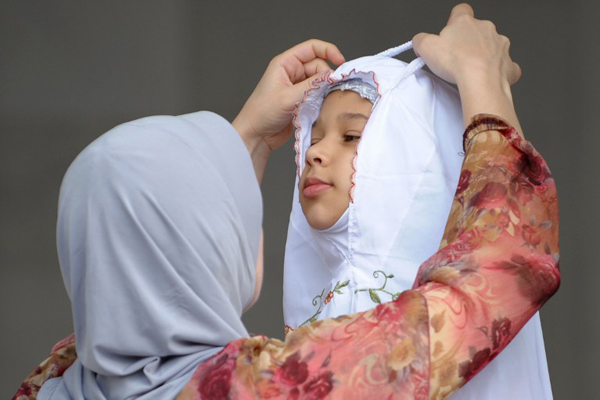40 Points a Muslim Parent Should Never Forget
- Give gifts to your daughter(s) first.
- Play with your children.
- Do not hit your child when they cry.
- Kiss your child.
- By saying Salām to your child, build their sense of personality and character.
- Do not ridicule the actions of your child, nor call them silly.
- Do not order or forbid your child too much, as this emboldens them and leads to rebellious behavior when older.
- Build your children’s characters by respecting them.
- Keep your promises.
- For the sexual training of children, the parents must first teach their children not to enter their bedroom without asking permission.
- Spoiling a child creates weakness, and a lack of will and determination.
- Nothing silences the sense of self-trust in a child more than forcing him to do things they may not have the capability of doing.
- Pray for your children, both during pregnancy and afterwards.
- Reminders and requests should be given with gentleness and softness so as not to create a barrier between parents and child.
- If your child is respected, he/she is less likely to rebel against the rules of the house.
- A good role model is someone who adjusts their children’s desires wisely and with the correct techniques.
- Foster the faith of your child.
- Stay away from wrist-grabbing and bossy behavior with children.
- One of the duties of parents is to foster the innate nature of telling the truth in children.
- Do not use fear as a method of raising your child, as this causes damage to their personality and leads to psychological problems
- Cuddling and kissing a child is one of their soul-foods, and it is necessary that enough of this is given to them.
- Parents have a responsibility to make their children understand the indecency of sin and create an aversion for people who partake in this, and likewise, to reproach the bad and encourage the child’s good actions.
- The beds of children of 6 years and above should be separated from each other, even if they are both daughters or both sons.
- As well as the natural characteristics that the child inherits from his or he parents, the environment and Nurture of the child have a profound effect.
- There should be a difference in the order and expectations of the behavior of a child inside the home, and out; At home, allow the child to play freely.
- Always bear the unexpected behavior of your child to a limit and do not always take the mistakes of your child to be unforgivable, so that you are not always compelled to punish.
- When instructing your child, don’t mention the names of other children constantly, or compare them with others.
- Stories are a useful and important method of encouraging good qualities and characteristics, and discouraging bad ones, such as the rights of friends, faith, etc.
- The mischievousness of your child in the early years is a sign of increased intelligence in the older years, so you shouldn’t be too worried or punish it too much.
- Make your children perform Ŝalāt from 7 years, and fast from 9 years, either half day or more or less, depending on their abilities.
- Do not be quick to accuse your children of lying because until 5 years, real lying or lying out of self-interest is rare.
- Do not condemn a child who has tired you with their questions, as this weakens their sense of curiosity.
- Try not to quarrel, especially in front of the child, as this troubles them greatly and affects their personality.
- Children have a particular fear of the word death, especially death of their mother or father; Therefore, where it is not necessary, don’t speak constantly of your death, or the like.
- Find out about your child’s talents and develop these as much as possible.
- In terms of verbal aspects, do not over-saturate your child so that they go on the wrong path, nor under do it, as both these methods are dangerous.
- The single most important cause of the happiness of the child is the kindness of the parents.
- It is important that the parents give freedom and independence to their children according to their capabilities, so that they develop their initiative, innate independence and self-trust.
- Raising your child properly is one of the responsibilities of a parent, and lack of attention to this responsibility is a cause of reproach of the Imāms.
- Teach your children the Qur`an.
Source: “From Marriage to Parenthood The Heavenly Path” Written by Abbas and Shahin Merali



